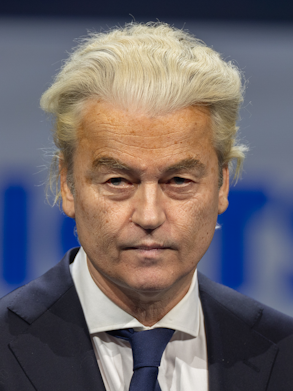Electoral Calculus Analysis Team have made the following prediction (on 28 October 2025) for the Dutch Election on 29 October 2025.

The upcoming election in the Netherlands (29 October 2025) is likely to reduce the parliamentary influence of Geert Wilders' PVV party, as the party is likely to lose seats and lose access to willing coalition partners.
Despite retaining a narrow lead in the polls, PVV faces a structural collapse in coalition viability. The party's dominance of Dutch politics has peaked, and it now risks transitioning from insurgent disruptor to isolated former incumbent.
After PVV left the governing coalition in June collapsing the short-lived Schoof cabinet, the government became a caretaker one. An election was called for the end of October, leading to an extended electoral campaign. Wilders had hoped that intentionally collapsing the government would reassert his party's position as separate from institutional failings and as the evident anti-establishment electoral vehicle.
The key election issues which have dominated headlines have centred around immigration and housing. The upcoming ballot has also in effect become a litmus test for the public's desire to see Wilders return to government. As the electoral campaign has proceeded, the electorate have turned away from populist soundbites and have begun to coalesce around the centre ground and a more technocratic/managerial political approach.

First, despite not becoming Prime Minister after the last election, Wilders and PVV were largely seen by the public to be the driving force behind the Schoof cabinet. Considering their position as the largest party, the electorate's perception of politics largely attributes the failure and collapse of the previous government to the PVV. Instead of being positioned as an insurgent anti-establishment outsider, the PVV are now associated with government stagnation and failure, limiting the potency of their message as serious agents of change.
The mismanagement of optics and failure to catalyse momentum was exemplified by a June 2025 poll, which reported that 61pc of voters held the PVV responsible for the collapse of the government. Additionally, 60pc of voters felt that by collapsing the government PVV put party interests above the national interest (Ipsos I&O, 6 June 2025).
Second, an extended election campaign has reduced their capacity for momentum. The PVV were responsible for collapsing the previous cabinet and forcing a new election, but the nearly five months between collapse and election has reframed the PVV as being subject to parliamentary/governmental affairs, as opposed to leading and directing them.
The primary areas of debate at this election have centred around the intertwined issues of immigration and housing. While this may be seen to suit PVV, the polarity of Wilders and the lack of success attributed to their recent stint in government has helped to push support back to the Christian Democrats (CDA) and split the right-wing vote with the Conservative JA21. The length of the campaign has also created a sense of issue fatigue among the electorate, with perceptions of competence and trust holding as much weight as positions on immigration and housing. Whereas the growth of the CDA provides a greater existential threat to the PVV, the rise of JA21 is likely to eat considerably into PVV's vote share and could potentially prevent them from returning to parliament as the largest party.
The leader of the CDA, Henri Botenbal, has largely managed to cultivate an image of stability and rationality to the right of centre in the eyes of the electorate, choosing to focus primarily on tackling the housing crisis as opposed to immigration, and consequently has the highest favourability ratings of all party leaders.
His party's rise in the polls has also been buoyed by the complete collapse in support for the NSC (also Christian Democrat) and a substantial drop-in support for the centre-right VVD, both major players in the previous administration. An aggregation of polling in October puts the CDA on 14.7pc of the vote, second only to Wilders' PVV on 18.5pc, and up substantially from the 3.3pc the party received in the 2023 election.
The leader of GL/PvdA (Green/Labour Alliance) Frans Timmermans is the other candidate most likely to be charged with constructing a post-election coalition with his parties aggregated polling for October standing on 14.3pc, marginally behind the CDA.
As the electorate are aware that Wilders is likely to be left out of the coalition-building process due to all major parties ruling out working with the PVV, the race for Prime Minister is effectively between Timmermans and Botenbal. In the final days of the campaign, this could lead to a minor spike for one or both of the parties.
A recent surge in support for the centre-left D66, rising from 9.3pc (3-6 October 2025, Ipsos I&O) to 14.4pc (23-24 October 2025, Ipsos I&O), puts party leader Rob Jetten in with an outsider chance of pushing for the premiership.
| Party | Predicted Seats | Seat Range |
|---|---|---|
| PVV | 28 | 22–34 |
| CDA | 25 | 20–29 |
| GL/PvdA | 24 | 21–28 |
| D66 | 18 | 14–24 |
| VVD | 16 | 12–21 |
| JA21 | 13 | 9–15 |
| BBB | 4 | 3–6 |
| NSC | 1 | 0–2 |
Weighted poll of polls as of 26 October, adjusted for turnout and polling limitations. Dutch polling has historically struggled to accurately gauge support levels for the PVV, leading to the requirement for a greater margin of error.
At the actual election, the PVV declined in support and seats as we predicted and may not be part of the new government. They won 26 seats which is close to our central prediction of 28 seats, and well within our predicted range for them of 22–34 seats.
The D66 did better than predicted, also winning 26 seats. We commented above that their recent surge "puts party leader Rob Jetten in with an outsider chance of pushing for the premiership", a prediction which looks like it could come true, although coalition deals have not yet been made.
You can read our original (and time-stamped) prediction Tweet.